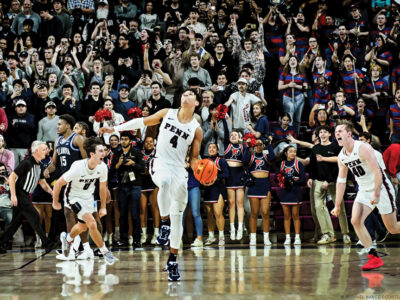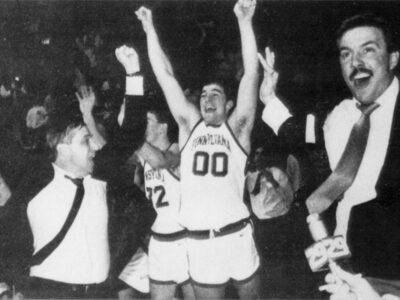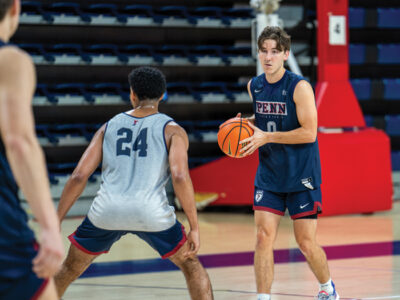By David Porter | As Penn’s basketball team put the finishing touches on a 60-47 win at Princeton to conclude a season that can charitably be described as challenging, it was hard not to view half-empty Jadwin Gym as more than just a symbol of the home team’s current deflated state. More specifically, is the Quakers’ glass half-empty or half-full as the program continues its gradual transformation under second-year coach Glen Miller?
The bespectacled Miller pulled no punches as he sat in Jadwin’s interview room three floors below the basketball court.
“It’s been a difficult year for us,” he said. “At Penn, you know it’s really first place or last place, and we know that and we accept that. But I thought we made some strides as the year went on.”
On the half-empty side, the 2007-2008 squad’s 13-18 record represented the most losses in a season since the 1956-57 team went 7-19. Conversely, six wins in the season’s final 10 games gave Penn an 8-6 mark in the Ivy League, a passing grade for a team that began the season with nine freshmen and sophomores.
Through it all, senior Brian Grandieri was a model of consistency and versatility, leading the team in scoring (13.2 points per game) and rebounding (5.9) while shooting 48 percent from the field. In the final 10 games he averaged 15 points and raised his shooting accuracy to 55 percent. More important, he provided a steadying presence for the younger players.
“A guy like Brian who’s playing with a bunch of young guys, he did a terrific job of leading us this entire season,” Miller said. “I was particularly impressed with his approach and his attitude after we were out of the Ivy League race and he continued to compete and pull this group together and help us make strides.”
After being part of three Ivy championship teams in his first three seasons, even the normally unflappable Grandieri would seem to have had ample reason to let the season’s travails put a dent in his resolve. But he stayed the course, and after the season finale at Princeton came into the post-game interview room sounding an upbeat note.
“Any time you can put on a jersey and play is fun. That’s the way I approach it,” he said. “I really don’t have any regrets. I told the guys that this was a great win and just to keep this thing going.”
Whether or not that will happen is the $64,000 question for a program that has not gone back-to-back seasons without at least a share of the Ivy title in 10 years. It is also a program in transition, though by the time the Quakers reconvene next fall there will be only four players left who were recruited by former coach Fran Dunphy (five if Tommy McMahon is able to return from a serious hip problem).
Several of Miller’s recruits made a deep imprint on the recently completed season, none more so than freshman guard Tyler Bernardini, who was named the Ivy League’s rookie of the year after averaging 12.9 points per game. A hallmark of Penn’s championship teams has been the player who transcends his role and elevates the play of those around him. Bernardini is the obvious candidate to follow in the footsteps of Allen and Maloney, Jordan, Onyekwe and Jaaber—but there is work to be done, according to Miller.
“He’s like all the young guys, he needs to get stronger and just a little bit tougher,” the coach said. “He’s a skilled offensive player, but he’s got to learn a lot of things, like moving without the ball on offense, making himself harder to guard, becoming a better defender. He’s done some good things for us this year, and all this experience he gained should help him.”
The abovementioned players all had supporting casts that could lead as well as complement, and that is the challenge for Penn’s current crop. Forward Jack Eggleston was nearly as big a revelation as Bernardini, scoring in double figures eight times, highlighted by 18 points in a 70-63 win at Yale on February 29. Like Bernardini, the willowy (6-8, 215) freshman needs to bulk up to become more of an inside presence on both ends of the court.
Getting the ball to those two players should be at the top of Penn’s to-do list. Freshman point guard Harrison Gaines was occasionally dazzling in the backcourt this season, but as a team the Quakers had more turnovers (491) than assists (425) for only the fourth time since the 1990-1991 season. In fairness to Gaines, it should be noted that two of the previous instances were in Michael Jordan C’00’s and Ibrahim Jaaber C’07’s first full seasons at the helm, in 1996-1997 and 2004-2005, respectively, and they each went on to rewrite Penn’s record book.
“They have a lot of areas to improve their game but they did get quite a bit of experience this year,” Miller said about his young team. “We did some good things down the stretch. We’re going to have to work extremely hard, but I have every reason to be optimistic going forward.”
Ron Berkowsky’s introduction to the sport that would eventually bring him national acclaim didn’t follow the usual script for young athletes. Consider it an example of sport imitating art.
“My brother and I watched The Three Musketeers movie, and we thought it was the coolest thing we’d ever seen,” Berkowsky said. “Then my parents told us it was an actual Olympic sport.”
Inspired as an eight-year-old by Athos, Porthos, and Aramis to become a fencer, Berkowsky will leave Penn as one of the best in the program’s long and illustrious history. He capped his senior season with a silver medal at the NCAA Championships in March, his second consecutive second-place national finish. Berkowsky finished high enough to achieve All-America status in all four years, something no Penn fencer had ever done. Brother Jon, a sophomore, earned honorable mention All-America status.
The blending of the physical and mental aspects of fencing has always appealed to Berkowsky; he described the sport as “physical chess.”
“You have to rely so much on your intellect and thinking ahead,” he said. “It’s like boxing but without punching somebody.”
Berkowsky’s foe in the NCAA final was the same fencer who had beaten him a year earlier, Ohio State’s Andras Horanyi. The rivalry between the two dates back to age-group competitions, but Berkowsky wasn’t able to duplicate some of those earlier victories over Horanyi and he fell by a 14-7 final score.
“He’s an amazing fencer,” Berkowsky said. “I’m not upset about losing to him.”
David Porter C’82 writes for the Associated Press.




